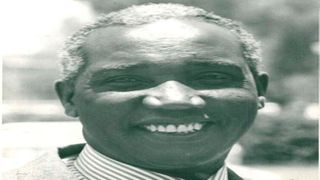
Former Deputy Director of Intelligence Stephen Mwangi Muriithi.
| File | Nation Media GroupNews
Premium
Stephen Muriithi, the ex-spy boss who sued Moi to the grave
What you need to know:
- His lawyer Paul Mwangi said that Stephen Mwangi Muriithi's instructions before dying were that he proceeds with the appeal.
They were business partners but fell out in 1982 following an attempted coup that rocked President Moi’s administration in its early years.
Decades later, former deputy director of intelligence Stephen Mwangi Muriithi – who died Monday – would sue his former business partner, former President Moi seeking close to Sh2 billion.
In the precedent setting case, Mr Muriithi sued Moi personally, accusing him of abusing his presidential powers and unlawfully detaining him, with an intention of depriving him of his properties.
He won in 2011, when Justice Jeanne Gacheche directed Moi to pay him for the loss of business and detention without trial. The compensation included damages for loss of property and for illegal detention.
Mr Moi appealed against the decision and three years later, a bench of three judges of the Court of Appeal overturned the decision saying Mr Muriithi had failed to table evidence to prove the claims that he held a majority stake in the three companies he claimed to jointly own with Moi and former spy chief James Kanyotu.
After losing the case, Mr Muriithi wanted to move to the Supreme Court but his appeal was rejected by the Court of Appeal on the basis there was nothing of great public importance in the matter. But the ex-spy chief went to the Supreme Court directly and the judges agreed to hear his plea.
A date was set but Mr Moi died on the hearing day, forcing the matter to be adjourned. Mr Muriithi substituted Moi with senior counsel Zehrabanu Janmohamed, an executor of Moi’s estate, in the appeal.
Case continues
Last week, his lawyer Paul Mwangi received a notification that the hearing of the case will be on July 22.
He was looking forward to the case but unfortunately, he died Monday after a long illness. But before his death, he told his son to ensure that Mr Mwangi pursues the case to the end.
“I can confirm that his instructions on his death bed through his son was that I must fight his case to the end,” Mr Mwangi said.
Among the companies they allegedly co-owned are Fourways Investments Limited, where Mr Muriithi held 40 per cent shareholding, Mr Kanyotu held a similar percentage, Sadru Alibhai (1 percent) and Moi (19 percent).
Also in contention is Sheraton Holdings Limited, where he allegedly held 40 percent, Mr Kanyotu (40 percent) and Moi (19 percent) and Mokamu Limited- where all the three held 33 percent shareholding each.
He said he had a majority stake in the three companies that owned Kenwood House on Kimathi Street, Atlas Building on Moi Avenue and Ruprani House but they were sold off while he was in detention.
Mr Muriithi also claimed that Mokamu ltd owned a 1,020 acre parcel of land in Solai, Nakuru County.
It was his contention that Moi ordered his unlawful detention without trial, and used the opportunity to deprive him of his property rights.
While overturning the award in 2014, Justices John Mwera, Daniel Musinga and William Ouko said Mr Muriithi sued the wrong person, Moi, instead of the Minister who issued the order of his detention on behalf of the State.
Lawyers Paul Mwangi (left)and Guandaru Thuita (right), both representing Stephen Mwangi Muriithi, and lawyer James Ochieng Oduor, for former President Moi, at the Court of Appeal in Nairobi on November 26, 2013.
Other evidence
The Judges also said Mr Muriithi failed to prove the case by use of documentary evidence such as certificates of incorporation of the three companies together with Articles and Memoranda of Association, the names and addresses of the shareholders, the shareholding of each, and documents of title to show that each of those companies owned parcels of land he claimed.
They also said he did not table evidence that the properties were sold, to who, at what consideration and when the sales took place.
“By that or such evidence as the learned judge should have required, the 1st respondent (Muriithi) would have been on his way to prove existence of facts to satisfy the court that indeed those facts existed. That was his burden. He did not discharge it.
“Claims by Mr Muriithi that he jointly had three companies with Moi to ascertain percentage of shares were not proven. His claims that Moi sold off and transferred some of the properties were also not proven,” ruled the judges.
Thereafter, Mr Muriithi applied for certification before the Court of Appeal, seeking permission to pursue an appeal before the Supreme Court, but his request was rejected. He moved directly to the Supreme Court and the request was allowed.
And after getting the request, Mr Moi passed on the day the case was slated for hearing, forcing the matter to be adjourned. He would later list the executor of Moi’s estate as the respondent.
In the second appeal, Mr Muriithi maintains that Moi wrongfully exercised his presidential powers.
He said although section 85 of the former constitution allowed detention without trial, it was under specific circumstances, provided for in the law. But in his case, the act was invoked with the motive of depriving him off his property.





